THE BUDAPEST SENTINEL: Translation of Blanka Zöldi’s article “Even sliding on our hands and knees we have to bring up the water” (“Akár négykézláb csúszva is, de fel kell hozni a vizet”) published by abcug.hu on 5 January 2015. Photographs by D. András Hajdú.
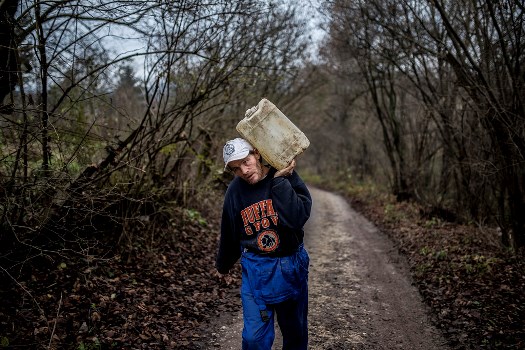
Drinking a glass of water. Washing one’s hands. Brewing a cup of tea. In Lyukóvölgy this does not simply happen by opening a tap. Part of Miskolc and yet one of the country’s largest segregated areas, there is neither school, not doctor, nor store, nor street names. But it is the lack of central water that causes the greatest hardship on a daily basis. Situated some six kilometers from the city, some four thousand people live along the length of the captivating, picturesque valley and mountain ridge. Many moved here from the gypsy neighborhood in Miskolc condemned to demolition with numbered streets. As the saying goes, from one misery to an even greater misery.
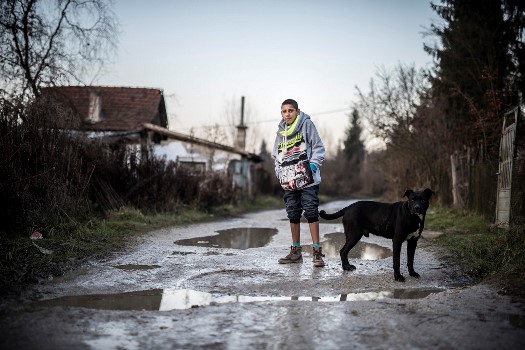
The water must be carried home from the public wells along the street. The more one can bear to carry, the fewer trips one has to make on a daily basis. In this way adults often carry 30-40 litres of water at a time. There are many public water pumps in the valley. However those who live at the top of the mountain often must walk kilometers to reach it. “In summer it is tolerable, but at other times we ust slide and climb through an ocean of mud. If all else fails, we carry it up climbing on our hands and knees” says a 27 year-old mother who is standing in the cold of December in a t-shirt and a pair of Chinese rubber flip-flops while taking a break from cutting wood. “I’m not cold. People are hardened here. I can manage two twenty liter balloons.”
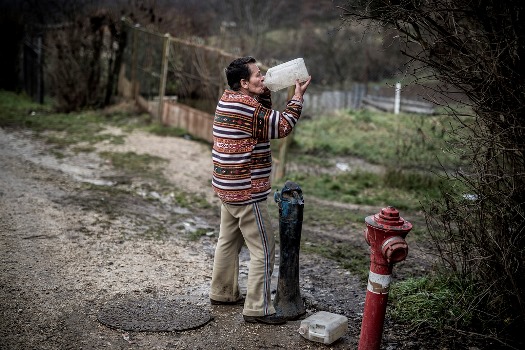
If there is a man in the family, it is enough if he makes one or two trips to the well each day. Women with small children, on the other hand, often must make the trip every two or three hours. In winter they are afraid that the tap will freeze. In that case there are two possibilities: either walk several more kilometers or thaw the tap themselves. They wrap tires or rags around it and light them. They burn them until the well tap heats up. Two years ago the winter wasn’t that hard, but even then the taps froze. “They constricted the flow of water, the pressure was lower, with the result that water freezes more quickly. Allegedly they did it because we were wasteful” said the one local man. Wastefulness means that they not only used the water for drinking and cooking, but also for bathing and watering crops.
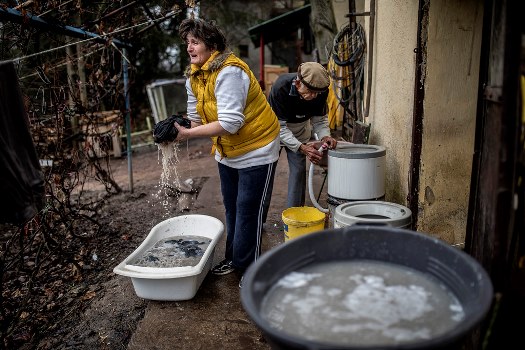
On the muddy roads the clothes quickly become soiled. And since there are not many changes of clothing, we have to wash the clothes two or three times. Sara’s family has a well in their garden which they operate as a kind of quasi house water works . They do not have an automatic washing machine, and for this reason a wash takes three or four hours. Sara’s older parents also join in the work, pouring the grey wash water into the yard in the freezing cold. They say that they are used to the wash but that there are a lot of problems with rats. No matter how orderly the entrances to their homes, it is impossible to exterminate the pests.
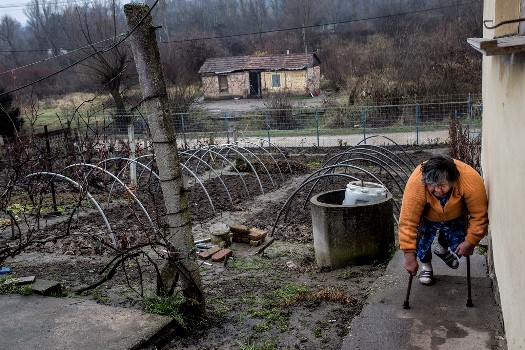
“A long time ago this place was a jewel box, a vacation spot for miners. The residents themselves cleared the drainage pipes and cleaned the streams. The current residents do not maintain such order. They don’t even know to plant some carrots and beans, or not to have so many children” complains aunt Marika, who can only stand up straight from her crutches with difficulty for a few seconds. She says that her neighbors are good people, just unfortunate. The house of the woman living across from her burnt down a few years ago. Her 15 and 16 year-old sons built a new house in its place from used brick with their own hands. Seven people are living there on HUF 107,000(USD 400) a month. Sara’s family can help her neighbors by sometimes given them work. She pays them HUF 600 (USD 2.25) to scrub the floor.
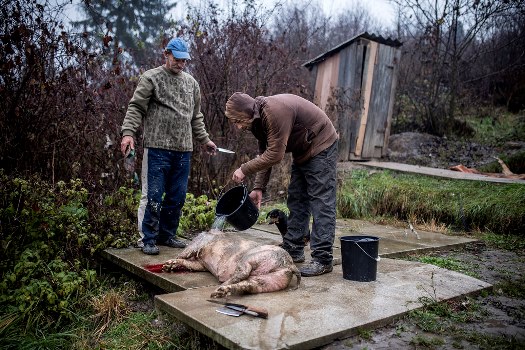
At Krisztián’s place on December 6th. They slaughtered a pig on the day of Saint Nicholas. By morning festive music can be heard coming from the house, and the men are past their first shot of pálinka. The house is lucky because right in front of the house is the street well-tap. Otherwise they could not even solve the problem of continuously drawing buckets of water. “The pig this year is rather thin, but we couldn’t wait any more. We need the food” said the head of the pig slaughter who is not a butcher, but “knows from experience how things go.”
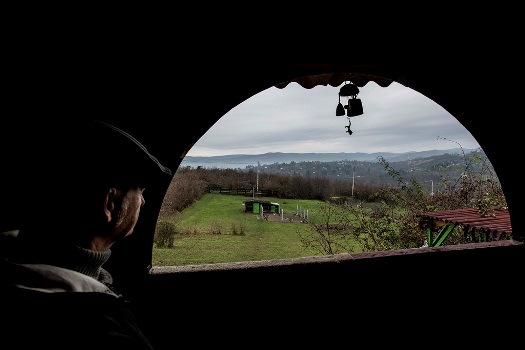
Few keep animals in Lyukóvölgy. Bela (46) has a coop with 47 chickens. “I make the soup with chicken from the shop because my wife and children love the animals so much that we don’t slaughter them” says Béla, whose entrance is perhaps the most orderly in Lyukóvölgy. He married a gypsy girl nineteen years ago. Since then neither his nor her family talks to them. “First we bought a shack here. We lived like Indians. I bought horses, carriages, saws on credit. We worked and we saved. At first we used candles for light. Then we lit from a battery, then from a generator. Six years ago we brought the electricity up here” boasts Béla while looking at the scenery. “From a distance this place is pretty, but if you go closer, you only see the filth and the garbage.”
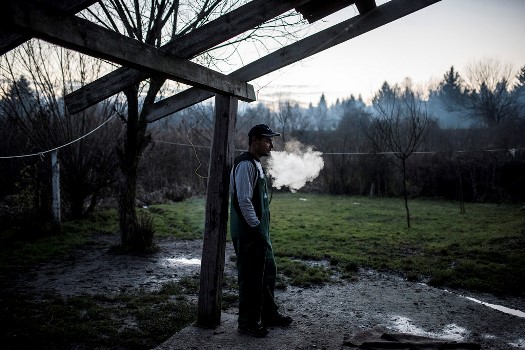
“I am in work clothes all day, because I will be dirty up to my knees as soon as I step out the door” says Zoltán. He has been doing public work for three months for the town. He has a job until December 31st, but after that he must wait two months before he can sign up again for a job. His wife attends remedial training in order to finish high school for which she receives HUF 50,000 (USD 185) a month. ”I am learning to cut grass. They have been training us for half a year how to cut grass. There isn’t much point to it. I’m not going to do that for work anyway” says Melinda. However, the money she receives for the training is needed so that they can move away from their current house. ”Here we are always inundated with water. The walls are moldy, they could even make diamonds ugly”.
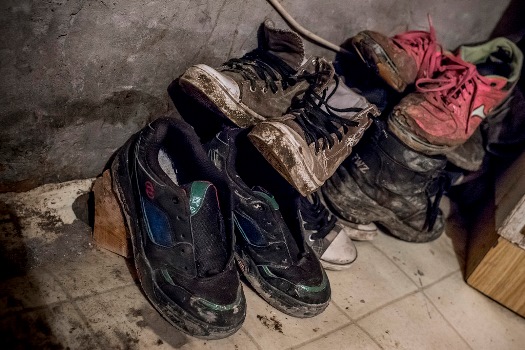
They say the people of Lyukóvölgy can surely be recognized from a pair of things: their shoes. “The mud and the muck is such that it eats shoes. There are some who must replace their shoes every two weeks”. Parents try to do everything so that the children will not talk about it at school, but this is a difficult problem to solve. “By the time they get to the bus stop they are covered in mud. We already tried putting our shoes in plastic bags, but it doesn’t help much” says Zoltán. Families take care to ensure the children go to school in attractive clothes. They shop at the Chinese store because it’s the cheapest there.
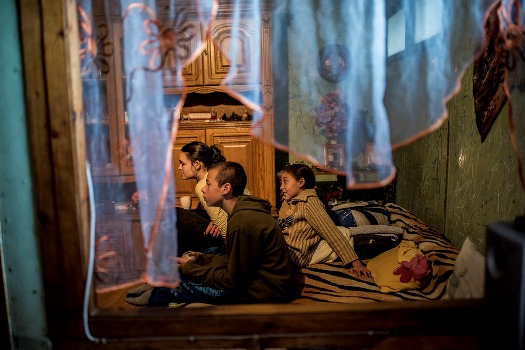
“Nothing is impossible, there are only helpless people. You just have to think about things and then you can get from one to two. We do not buy cheap clothes in the Chinese store, but prefer to buy well known brands at the used clothing store, because they last longer” says Béla. He has never liked washing clothes because he still cannot count how many balloons of water he has to push up the mountain on his bicycle. “Once my wife said that there will be a lot of dirty clothes by the time you get home, so bring enough water for the wash. I was so sick of carrying water that I took all of my clothes and burnt them. When my wife got home I told her “there isn’t any water, but don’t worry. There aren’t any dirty clothes either!”
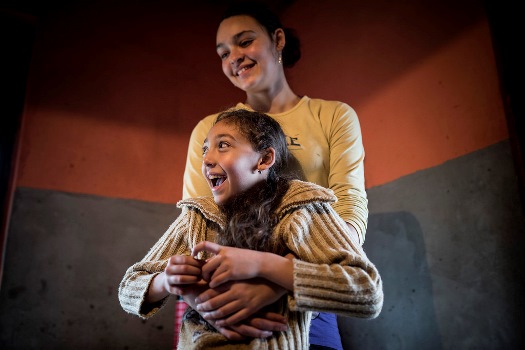
Béla is proud of the fact that he saved enough for his children so that they have normal furniture, and even a large screen television and a computer. As the children grow up, however, the lack of water is felt more and more. The women cleverly solve the cooking and cleaning with water from plastic battles. Bathing is more complicated. There is a plastic tub for the women and a basin for the boys. They employ tricks so as not to see one another naked in the small flat. The parents are afraid of the winter break because the children do not get anything to eat at school. “For 19 years I didn’t remove my wedding ring once, but now I had to give it to the pawn shop. I got HUF 15,000 (USD 56) for it” says Marika while rubbing the place where her ring used to be.
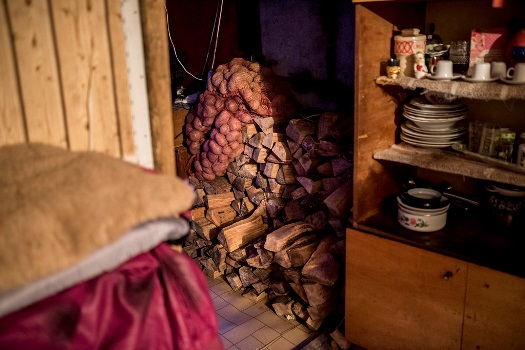
“I put a padlock on the door to the pantry because the children were wasteful, pouring sugar into their tea” said Julianna, while showing us two weeks worth of food stored on the top shelve: oil, sugar, pasta, flour, some spices. Apart from this they have one and a half sacks of potatoes. Julianna (like many living in Lyukóvölgy) did not want us taking her picture, because she is ashamed of the circumstances in which they live. Six years ago they lived in a four room house, but over the past few years everything collapsed. The new stove was faulty and burnt down the house. Apart from a few photographs nothing remained. Her husband became addicted to gambling games and was sent to prison for theft. His children haven’t seen him for three years. Julianna’s father developed cancer, dying at home in his daughter’s arms, without medical assistance. The family called the ambulance before he died, but they just hung up the phone. They said they were not willing to go to Lyukóvölgy.
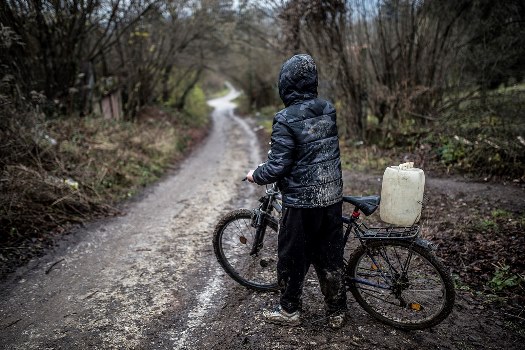
“My parents divorced. Then we had to move here from Miskolc with my step-father because there was a cheap house here. We don’t like living here that much. Our friends don’t visit us” says Dominik before hopping on her bicycle and riding it at blinding speed down a slippery road to the valley whence she brings the water. “We are saving up to be able to move to Germany. It would be better there. There would not always be this mud and carrying water” she says.
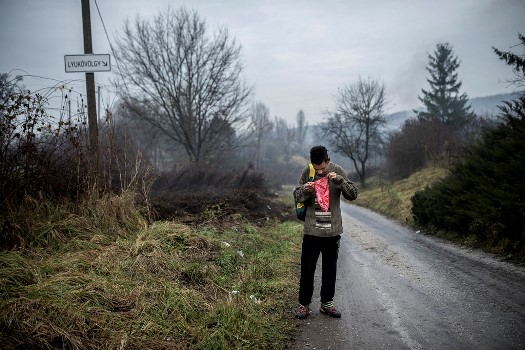
“Today I am Santa Claus” says a 17 year-old boy the morning of December 6th. He studied to be a house painter. For his vocational work he receives HUF 17,000 (HSD 65) a month. From this he saved up to be able to buy gifts for his eight younger siblings. He buys everybody HUF 300 (USD 1.15) worth of chocolate and candy. “My little sister puts their shoes on the window sill. It cannot be that they receive nothing.”

